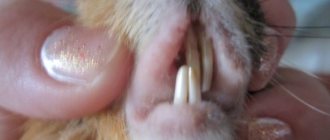- home
- Guinea pig
- General information about guinea pigs
02/06/2019 Guinea pigs are sensitive to changes in voice intonation.
They are able to recognize when the owner is angry or when he wants to play with him. Pets have excellent hearing and are able to express emotions and desires using a range of sounds. You don't need to be a wizard to understand what guinea pigs are talking about. It is enough to listen carefully to your pet.
What does it mean when a pig squeaks?
It is not difficult to understand the meaning of the sounds that the animal makes. When a pet squeaks, there are reasons for this:
- By squeaking, males attract the attention of females during courtship. So this could represent the mating sounds of guinea pigs.
- Newborn babies squeak furiously when they want to eat or something is bothering them.
- When an animal experiences physical pain, it squeaks.
- Pigs are very sociable, they get upset if you don't pay attention to them. He will squeak pitifully to make his owner feel sorry for him.
- Expression of fear, fear. Perhaps a dog or cat came into the animal’s field of vision, with which it had not yet become friends.
- The squeak of a guinea pig can also mean a request to get something. If an animal sees that its owners are eating, it will squeak and beg for food from the table.
- By squeaking, the pet expresses indignation at the situation. For example, if his favorite toy was taken away or there is no water in the drinking bowl.
- A joyful squeak also happens: when a pet meets its owner or is picked up.
- A barely audible, plaintive voice may mean that the rodent wants to eat.
Thus, the squeak expresses a wide range of feelings depending on the circumstances. It is imperative to respond to the voice of a guinea pig. It is important for an animal to be understood.
Squeaks
Why does a guinea pig squeak? There are several reasons why she does this.
In their natural environment, frightened pigs squeak. A newborn animal tells its mother about its concern by squeaking. Males use this method of communication during courtship. The animal also squeaks when it is in pain.
Tamed animals use this sound to evoke pity from the owner and to attract attention. It could be a protest. For example, if an animal sat calmly on the owner’s lap and enjoyed stroking, and then it was abruptly put in a cage and deprived of pleasant communication.
Begging may also be accompanied by squeaking. Breeders who have a cage with a pet in their kitchen eventually notice that every time they open the refrigerator, the guinea pig screams.
Om-Nom-nom! Yummy!
A squeak when the owner appears can express joy from a long-awaited meeting and anticipation of a traditional tasty treat.
A hungry pet squeaks to inform the breeder of its desire for food.
It is important to learn to understand your ward and not attribute all his calls to whims. The animal may really need help, even medical help.
Rumbles, purrs or growls
When an animal purrs, it often means a negative attitude towards the situation. This sound is different from purring, which expresses pleasure and approval of what is happening around. If you sit a rodent on your lap and stroke it, it will purr like a cat.
Rumbling can also express pleasure if this sound is combined with body vibration. The pig can express joy vigorously. If it purrs and vibrates, in 99% of cases this means anticipation of a happy moment. For example, when they lay out an enclosure in front of a cage for walking. The animal’s mind is ingrained in the understanding that the enclosure is a pleasant walk, and he will be happy.
If a rodent growls, it does not always mean that it is angry. During the mating season and at the moment of mating, the animal can growl in a low pitch. If you listen closely, such a growl is radically different from the sound that a pet makes when angry.
And he behaves strangely...
Owners who have recently acquired new “tenants” are often bothered by the squeaking of their charges in a variety of situations.
Problems with stool and urination
Does he squeak when he goes to the toilet? Often such a sound is accompanied by the need to cope with natural needs - both small and large needs.
In this case, you first need to simply observe the further behavior of the animal. If a slight inflammation occurs, then simply ensure your pet is clean and warm in the cage. However, a squeak can be a signal of disorders both in the genitourinary system and in the gastrointestinal tract. In this case, it is necessary to urgently take the animal to the local Aibolit.
And suddenly it bites!
Pets may squeak when they are angry. It was already noted above that a squeak can mean dissatisfaction or protest.
The same applies to bites. Most often, they can be “rewarded” by an animal that is unwell, and against its will (he doesn’t realize that for purely humane reasons!) they take it in their arms - how can you not be indignant!
Listen to the sound.
And good luck, and the treatment procedures will begin. Here both teeth and voice will come into play.
The same applies to pregnant females, who are annoyed by any attempt to invade their personal space.
Are your teeth itching?
Chewing on rods is not dangerous.
Owners often notice that the guinea pig seems to be gnawing on the bars of the cage. And the question naturally arises: maybe this is how she grinds her teeth down? In such cases, experts reassure: the rodent clamps the rod in a completely different area from where the teeth are. Simply the chewing movements made make this sound quite loud. It may also be accompanied by a squeak.
Sociable pigs locked in a cage suffer greatly from loneliness and gnaw at the cage “out of grief”; this is rather a type of pig psychosis, which, however, is easily curable. All you need is:
- place the pet in a larger cage,
- give the opportunity to actively move in a special pen or even on the floor,
- place a friend in the home, remembering that the animals must be same-sex (to avoid unplanned reproduction),
- provide food in sufficient quantity.
Active running and jumping
Squeaks and runs? Most often, this is how complete satisfaction with life is expressed. This behavior is especially typical for young individuals. They cheerfully rush around the cage squealing and hooting, infecting older pigs with their delight.
At the same time, noise, fuss, squeaking, and whistling are heard. This does not last all the time, so there is no cause for alarm.
However, it may happen that the movements of the animals are too active and restless; running alternates with jumping and is also accompanied by squeaking; pigs itch periodically.
Carefully examine your pet's fur and skin, paying special attention to dandruff, bald spots, sores, and hair loss. If such signs are present, we can assume the presence of a fungus, subcutaneous mite or lice-eater.
Does your pig squeak often?
Yes, all the time! No, rarely.
Someone have pity on me!
A pet complains when it is scared. This is most often done by cubs for whom the new world is still unfamiliar. To make them feel calmer, their mother should be nearby.
The same applies to adult pigs who, for some reason, have changed their place of residence. After some time, when the animal gets used to it, the plaintive squeak will stop.
And adult individuals, already trained by living next to a person, attract attention to themselves with such a sound: they say, I’m bored, entertain me.
A plaintive squeak can indicate that the animal is in pain, say, a paw is stuck between the bars, or it is not feeling well.
Such a signal can be sent when constipation occurs, and appropriate measures must be taken.
The sounds of a piercing whistle, which is more like a squeal, should alert the owner. They indicate that the pet is scared or in pain.
How to play with a guinea pig?
You can hear a grinding sound or the animal chattering its teeth
There are some sounds guinea pigs make that they don't make very often. You should pay attention to your pet when he chatters his teeth. This means he is very angry. If you look at the animal at this moment, you can immediately understand its condition. Teeth chattering is accompanied by sounds similar to hissing.
There is a reason for such aggressive behavior. Most likely, it is aimed at another animal. Those who are dissatisfied urgently need to be placed in different cells. It is recommended to remove the less aggressive animal.
Such situations do not arise often because pigs are friendly and rarely get angry. The fact is that animals are accustomed to being neighbors from childhood. If you add a couple to your pet as an adult, division of the territory is inevitable.
Animals need to be accustomed to each other gradually. First, place the cages so that the pigs can hear each other, then move them closer. When they stop being irritated by their proximity and begin to show friendly interest, you can sit them together for a while and observe.
If strange sounds similar to teeth grinding continue without a visible source of irritation, your pet should be taken to a veterinarian for a consultation. Problems with teeth or the gastrointestinal tract are possible.
Why does she constantly squeak?
A rodent makes a similar sound in several situations when:
- hungry,
- begging
- satisfied or equally
- dissatisfied
- requires communication
- shows who is “the boss of the house.”
The first point is quite clear: a hungry pig will give a “squeaking” signal, persistently and almost continuously, unless it takes a rest for about two seconds. How else can you show that you really want to eat?!
Another loud squeak will be associated with food (but not necessarily with hunger!): the animal, quite possibly, heard the refrigerator door slam and the owner rustled probably something tasty. How can one not ask, or better yet, demand?
Don't forget to give your pets treats. Of course, you can treat a little beggar, but keep in mind in the future: this can become a habit at the level of a conditioned reflex.
Try to pick up a guinea pig and pet it affectionately - and get ready: it may squeak quite a bit. She squeaks when you pet her - such is the pleasure this gesture gives her.
Now return the little animal back to the cage. The squeak will be repeated, but in a different tone, it will be sharp and drawn-out - protesting: this is how she will express dissatisfaction with your action.
Guinea pigs are very sociable animals. So, they squeak loudly when they see the owner - they are bored and require attention.
Squeaking is also a way to communicate that pigs of both sexes have a need to communicate in an intimate environment—you can’t cancel nature.
If you are the happy owner of a whole family of guinea pigs, then you have the opportunity to hear a menacing squeak, sometimes turning into a roar. It is the male who is carrying out “educational work”: it’s time, they say, to calm down. And at the same time, this shows the superiority of the head of the family over the rest - those who are weaker.
What sounds does a guinea pig make?
Squeals, whines or moans
The pig can squeal with delight. She so vigorously expresses joy when she was picked up.
The pet must constantly be in the thick of things. If you take him to the back room and don't pay attention to him, he will get bored. When it is not possible to devote time to an animal, it is better to buy him a same-sex pair.
Walking around the room, the animal can easily make friends with other pets. Much will depend on the characters of the pets. If the kitten or puppy is sociable and friendly, they will enjoy the proximity of an affectionate pig.
An animal can squeal loudly not only from delight, but also from pain and fear. When trying to free a stuck paw or when another danger threatens.
What do moan-like sounds mean? This means that the pet is sick. In this state, he whines or groans. He will stop doing this only when he recovers.
Why does the pig scream, squeal and whine?
These signs are very alarming signals that a guinea pig gives. Such sounds are made due to severe fear, physical pain or very poor condition. As soon as the owner hears screaming, squealing or whining, the condition of the pet should be immediately checked. Among the possible incidents, this could be damage to the paws or face, a scratch, or a fight with another pet. At the same time, the groan of an animal, which is accompanied by a number of other completely unfamiliar and strange sounds, is a complete antipathy towards strangers, children, animals or even pets to which the pig is not accustomed.
Guinea pigs are distinguished by their regular whistling. One of the reasons for sound manifestation is hunger. Try to feed your pet more often and then they will not pester you with hungry whistles. The guinea pig also whistles from the joy of meeting its owner. This is how they show their melancholy, or they saw something tasty in the hands of the owner.
Chirps or tweets
The pig can not only squeak and purr, but also chirp and chirp like a bird. The feeling from such sounds is as if the pet is singing. Such sounds mean an extreme degree of excitement.
The pig sometimes chirps for up to half an hour, not noticing anyone around, immersed in an exciting state. This is how she experiences severe stress.
The expectant mother can thus announce to everyone around her that she will have cubs. The male can use his chirping to attract the female to mate. If two pigs are chirping among themselves, you don't have to worry. Nothing bad happens.
Why do guinea pigs squeak?
Owners of guinea pigs know that these animals can squeak in different ways. And every squeak has its own meaning. Pigs squeak when they beg for treats, when they are hungry, or just want to attract attention. They also make such sounds when they are sick or feeling afraid.
They beg and want their favorite treat.
These funny pets are ready for various feats to achieve what they want. When they really want to get a treat, they stand on their hind legs and, looking into the owner’s eyes, make sounds similar to a squeak or squeal.
Important: if an animal is constantly begging for delicious food, and at the same time she looks unhappy, then you have spoiled her greatly, and it’s time to stop indulging her whims.
Really hungry
Sometimes inattentive or too busy owners may forget to put food in the pet's feeder. When a pig is really hungry, it screams for a long time and insistently to be fed.
Attention: to prevent your pet from waking you up at night, you need to give him a sufficient amount of food in the evening.
They want to “communicate” with the opposite sex
During the mating season, males also make characteristic sounds reminiscent of purring. If the female is not interested in the male's advances, she growls, snarls and bares her teeth, thereby scaring off the male.
Guinea pigs of different sexes live in your home
Show their superiority over other relatives
To demonstrate their superiority over weaker relatives, guinea pigs also use a squeak, which is more menacing and more like a roar. With such sounds, the rest of the family calms down and becomes more docile and obedient.
Because of fear
When pets are scared, they hide in a house or in the corner of a cage and squeak pitifully. Animals make the same sounds when they don’t like something. As a rule, this behavior is typical for young offspring or if you just got an animal and it is not yet used to you. More mature individuals try to attract the attention of their owner when they are dissatisfied or afraid.
Attention: once you realize that your pet is frightened by something, try to find out the cause and eliminate it.
Got sick
Attentive owners should immediately notice not only by the sounds, but also by the appearance of the pet that he is sick. Such animals try to hide in a corner of the cage, and when there is severe pain, they squeak piercingly. This squeal should alert the owner. At the first manifestations of various diseases, you should immediately seek help from a veterinarian. Since most ailments in such small rodents occur very quickly and with serious consequences.
We are glad to meet you
Guinea pigs are very sociable and friendly animals. When they see their owners, they begin to rejoice and make sounds. This is explained by the fact that the animals are waiting to be given their favorite treat or to be held in their arms.
When an animal is happy, it purrs
Whistling, sniffling, wheezing
If guinea pigs make sounds similar to snorting or whistling, this means pleasure or anticipation of it. This happens before a walk or after a treat. By whistling, the pet makes it clear that it is ready to eat or greets the owner.
The appearance of wheezing means breathing problems. Wheezing is a bad signal that indicates a possible illness or that the animal has something stuck in its throat. The animal must be taken to a veterinary clinic and first aid provided.
How to understand what a pig needs
The main thing that the owner of the animal needs to learn to understand it is diligence and attentiveness. Many animals have their own, characteristic style of communication. But still, the meanings of most sounds are the same for all pigs. Therefore, it will not be difficult to find out why guinea pigs squeak, whistle, sniffle and make other sounds. But in order to correctly understand your pet, it is important to correctly recognize the sound being made - growling or rumbling, hissing or snuffling, etc.
Language of the body
In addition to the sounds they make, guinea pigs show their mood through body language. If they are in an upbeat and good mood, they happily jump around the cage and jump in different directions. Also, the animal's bouncing indicates that it wants to play with its owner. But keep in mind that jumping around the cage for no reason indicates that the animal is simply being annoyed by parasites in its fur.
If a guinea pig suddenly freezes and stands completely still, it means that something has greatly surprised him and he is at a loss.
To familiarize themselves with their surroundings and evaluate them, pigs sniff everything. They also sniff the area of the nose, chin and ears when meeting a new relative. Pigs greet each other by touching their noses.
Important: Guinea pigs live on average from 5 to 12 years.
As a rule, when several pets live in the same cage, they become friends with each other. And only in rare cases do they perceive an unwanted neighbor as a rival. But this is the case when both females and males live in the same cage. When showing aggression towards their relatives, pigs stand on their hind legs in full height above the enemy. Along with such a menacing pose, the animals emit a hiss, begin to grind their teeth and the hair rises on their withers. In such situations, the owners must intervene and place the animals in different cages.
Pigs also show aggression; we sway their bodies from side to side. Such movements can also be observed during mating games.
If, while playing with the animal, you notice that it begins to fuss or worry, perhaps it needs to go to the toilet, or it is hungry. So it's time to put him back in his cage. Quite often, these animals lay down on the arms of their owners and throw back their heads. This indicates that the animal is tired and it’s time for him to go home.
Important: if a guinea pig licks its owner’s hands, this indicates its great love.











